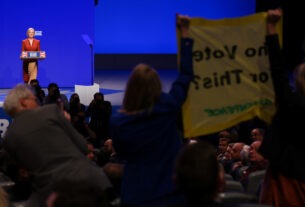Don’t expect the EU to strip countries’ veto power any time soon.
After a meeting of EU affairs ministers in Brussels on Tuesday, Mikuláš Bek, the European affairs minister for the Czech Republic, which currently holds the EU’s rotating presidency, said he only foresaw “limited progress” by year’s end on the issue.
“I’m not too optimistic,” he said, “but I don’t think the debate is lost.”
In recent months, many of the EU’s biggest powers have thrown their weight behind a movement to reform the EU’s decision-making process.
At the center of the conversation is the EU’s unanimity rule, which means every country must agree before the bloc can make a decision on issues such as foreign policy to tax rules. While the structure helps the EU present a united front, it has also slowed or stalled movement on any number of major issues, from Russia sanctions to corporate tax rates.
Many have also linked decision-making reform to expanding the EU eastward to incorporate new members like Ukraine or Moldova.
“It seems to me a political fact that for many member states, there exists a connection between real enlargement and changes in decision making,” Bek told reporters after Tuesday’s meeting.
Yet while the issue was discussed, Bek pointed out a practical reality: Change is hard.
Still, he said, “there’s some hope we could make some limited progress” during the Czech presidency, which runs until the end of the year.
Indeed, EU reform chatter has been circulating in Brussels for weeks and isn’t going away.
German Chancellor Olaf Scholz in late August made a high-profile speech calling for a massive EU expansion — but only after significant changes to the bloc’s operations. Several weeks later, European Commission President Ursula von der Leyen wove the subject into her annual State of the Union speech.
But actual movement through the EU’s grinding institutional gears has so far been minimal. And support for actually reforming the EU’s underlying treaties remains nascent. Also during the meeting it was clear that the majority were against treaty changes, said one diplomat.
Given that, EU affairs ministers have been discussing proposals to tweak the rules without opening up the treaties.
One option on the table: Making reforms via the EU’s passerelle clauses— a mechanism that allows countries to switch from unanimity to majority voting in the Council of the EU without needing to change the EU treaties.
Foreign policy has dominated the conversation. The unanimity rule for any foreign policy decision has led to drawn-out negotiations on issues such as sanctions against Russia. Hungary has also used its veto power to block even seemingly noncontroversial foreign policy moves, like an EU call to appoint a United Nations rapporteur on Russian human rights violations.
Hungary’s behavior has irked numerous EU members, influencing their desire to move away from unanimity requirements.
The EU has been “stopped by one member state” as it tries to respond to Russia’s war in Ukraine, German Minister of State for Europe Anna Lührmann told reporters ahead of Tuesday’s meeting. “I think that this should not stop us from acting in the future.”
Lührmann said Germany supported the passerelle clause route to making that change. The move would lower the threshold for certain foreign policy decisions to a “qualified majority” — a standard requiring at least 55 percent of countries representing at least 65 percent of the EU population.
Others are less enthused. According to one diplomat, some member states on Tuesday stressed that the EU has successfully adopted its most severe sanctions of all time against Russia, despite the need for unanimity.
Still, a Council document obtained by POLITICO revealed burgeoning support for change, noting “several delegations are open or willing to consider using the passerelle clauses.” The areas for potential reform include sanctions, human rights, and the non-military side of security and defense, according to the document.
“To a lesser extent, support is also expressed by some delegations for taxation, energy policy and non-discrimination matters,” the document adds.
But the initiative will, of course, take time — if it happens at all. The Council document adds that “due to the highly politically sensitive nature of this question” several countries “indicate that they would need additional time to reply to this question.”
And, ironically, deciding to use the passerelle clause to scrap unanimity rules requires its own unanimous vote. So that means Hungary could veto a rule change.
Despite that, several diplomats expected EU leaders to address the issue during a December meeting. They may even rule on whether to call a convention that would formally consider more far-reaching treaty changes.
As is often the case, however, nothing is certain. Others cautioned that the meager appetite for treaty change, plus the pressing problems of war and rising energy prices, could mean the issue is, once again, punted down the road.




